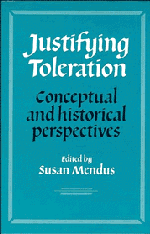Book contents
- Frontmatter
- Contents
- Preface
- Introduction
- 1 Scepticism and toleration in the seventeenth century
- 2 A more tolerant Hobbes?
- 3 Locke: toleration and the rationality of persecution
- 4 Toleration and Mill's liberty of thought and discussion
- 5 Rousseau and respect for others
- 6 The intolerable
- 7 Autonomy, toleration, and the harm principle
- 8 Friendship, truth, and politics: Hannah Arendt and toleration
- 9 Dissent, toleration, and civil rights in communism
- 10 Liberalism, marxism, and tolerance
- 11 Socialism and toleration
- Index
2 - A more tolerant Hobbes?
Published online by Cambridge University Press: 20 May 2010
- Frontmatter
- Contents
- Preface
- Introduction
- 1 Scepticism and toleration in the seventeenth century
- 2 A more tolerant Hobbes?
- 3 Locke: toleration and the rationality of persecution
- 4 Toleration and Mill's liberty of thought and discussion
- 5 Rousseau and respect for others
- 6 The intolerable
- 7 Autonomy, toleration, and the harm principle
- 8 Friendship, truth, and politics: Hannah Arendt and toleration
- 9 Dissent, toleration, and civil rights in communism
- 10 Liberalism, marxism, and tolerance
- 11 Socialism and toleration
- Index
Summary
Hobbes's Leviathan is a book which catches the imagination for many reasons – the vigour of the prose, the confidence of the author, and, above all the scope of the argument. Hobbes begins with the first principles of meaning and knowledge, continues through an account of human nature, and after justifying absolute governments concludes triumphantly with an analysis of the nature of religion, the proper powers of the churches, and the sources of the improper powers of false prophets. One aspect of Hobbes's case which particularly catches the eye of the philosopher is his apparent espousal of a conventionalist theory of truth; he seems to believe that we make propositions true by deciding on definitions of terms, and that one task of the sovereign is to create moral truths by imposing rules for calling acts or states of affairs ‘good’ and ‘bad’. It is an astonishingly bold, and implausible, view.
Leviathan also sets great store by education – in a wide sense of that term. We are born unapt for society and are trained into sociability. Put Hobbes's conventionalism together with Hobbes's obsession with social training, and we see a philosophical totalitarian trying to ensure that the very language we use, and the propositions we take for true, make the project of rebellion against our rulers incoherent. Why else should he insist that the sovereign cannot act ‘unjustly’ or ‘injure’ his subjects?
- Type
- Chapter
- Information
- Justifying TolerationConceptual and Historical Perspectives, pp. 37 - 60Publisher: Cambridge University PressPrint publication year: 1988
- 12
- Cited by



